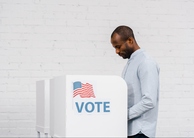Featured Article:Differences in Ethical Decision-Making and Reward Responsiveness in Individuals with Anxiety and Depression
By
2018, Vol. 10 No. 09 | pg. 1/1
IN THIS ARTICLE
KEYWORDS
AbstractThis study aimed to determine if anxiety and depression in individuals are related to deontological ethical decisions, with particular emphasis on the role of reward responsiveness as an underlying principle mediating any differences. Despite some studies indicating that anxiety and depression can impede upon general decision making, existing research has largely failed to address the impact of these enduring traits on ethical decision making. In order to assess this, three trait inventories measuring anxiety, depression and reward responsiveness, along with an ethical dilemma measure, were administered to a sample of 161 females and 44 males. Our results suggest that deontological ethical decision making is unrelated to both anxiety and depression. The data also signifies, however, that reward responsiveness was inversely related to both depression and anxiety. Finally, the results indicate that anxiety and depression are highly related. Implications of these findings are discussed. Symptoms of anxiety and depression can potentially impede upon an individual’s decision-making capacity (Pochard et al., 2001). In other terms, a person’s ability to make decisions, including ethical decisions, can vary or become skewed by certain character traits with potentially far reaching social ramifications (Bergland, 2006). Currently, there exists some research on the influence of personality variables as predictive factors in helping behavior and other research on the effects of anxiety and depression on general decision making. However, research specifically exploring the association between deontological ethical decisions and possessing traits of anxiety and depression is lacking and deserves further study (Darley & Batson, 1973). In addition, exploring ethical differences in individuals with higher levels of self-identified anxiety and depression further lays out the far-reaching social implications of such character traits in that ethical decision making is inherently a social enterprise. Moreover, collecting data about reward responsiveness provides insight into the underlying psychological principle that mediates any potential association between ethical decision making and the presence of these symptoms or traits. Therefore, this study focused on deontological ethical decision making differences in individuals with self-reported symptoms of anxiety and depression. Literature ReviewEmotions and general affect contribute to and can greatly influence decision making. Slovic (2007) notes humans’ tendency to rely upon affect, the subjective sense that a given entity or situation is good or bad, as a central basis for swift judgments and social navigation. Affect pertains to the emotional state of an individual. Tellegen claimed that affect is encompassed by two general factors, negative affect and positive affect, that are differentially related to anxiety and depression (as cited in Hooley, Butcher, Nock, & Mineka, 2017). While negative affect is strongly positively correlated with both anxiety and depression, positive affect is strongly negatively correlated with only depression and is, therefore, largely unrelated to anxiety (as cited in Hooley et al., 2017). Similarly, Clark and Watson proposed a tripartite model of anxiety and depression that built upon Tellegen’s theory in further asserting that high negative affect is associated with comorbid symptoms of anxiety and depression, whereas low positive affect is a specific factor primarily related to depression (as cited in Hooley et al., 2017). Collectively, this indicates that affect is an influential overarching factor in basic human decision making and shapes the presence of anxiety and depression in an individual.These positive and negative affective states have also been linked to ethical decision making. Isen and Levin (1972) explored the impact of an individual’s positive affective state on his or her willingness to help others, which is an inherently ethical decision. In their study, the researchers induced a positive feeling in participants by either giving them a cookie or having them find a dime. Then, these participants were measured against control groups to identify whether they were more likely to subsequently engage in helping behavior, either by picking up dropped papers or volunteering to aid in a confederate’s request. The results yielded from the study indicated that participants who were made to ‘feel good’ or who were induced to feel positive affect were significantly more helpful than control subjects. In this sense, as positive affect is linked to significantly greater helping behavior and, therefore, ethical decision making, it would be expected that individuals with a low positive affect, including depressed individuals as outlined by the theories of Tellegen and Clark & Watson (as cited by Hooley et al., 2017), would be less likely to act ethically in such a situation. Similar findings are outlined by Aderman (1971), who measured whether inducing affective states of elation or depression influenced the tendency for participants to offer their assistance in conducting an experiment. Participants in the elation condition offered more help to the experimenter in the study and more frequently offered their assistance for future enterprises compared to subjects in the depressed condition (Aderman, 1971, as cited in Isen & Levin, 1972). In coordination with such studies relating affective states and ethical actions, the decision making of individuals with marked anxiety or depression is often impacted by their symptoms of worry or sadness respectively (Hartley & Phelps, 2012). Paulus and Yu (2012) detail a study in which emotional dysfunctions are linked to a skewed decision-making capacity, a finding particularly relevant to anxiety and depression in that both of these character traits are defined in terms of negative emotional or affective experiences. More specifically, anxiety, from a neuropsychological perspective, is partially created and maintained by disrupted neural circuitry and an accompanying fear learning that additionally contributes to alterations in normal decision making techniques (Hartley & Phelps, 2012). Similarly, several studies have identified potential links between depression and impaired decision making. In assessing depressed and nondepressed individuals’ performance on a social and economic dilemma task, Harlé, Allen, and Sanfey (2010) found that participants with depression were more likely to exhibit strong emotional reactions when making decisions compared to the control group. In addition, individuals exhibiting symptoms of depression tend to engage in dysfunctional self-focused attention (Watkins, 2004) that can further distort decision making due to a failure in adequately attending to the social implications of decisions. Collectively, these findings indicate that there are a number of contributory factors related to anxiety and depression that could be implicated in skewed decision making. However, while these factors generally impact decision making in anxious and depressed individuals, perceptions of risks and reward responsiveness are indirectly implicated in differences in ethical decision making. Forbes et al. (2006) note that general perceptions of risks and rewards are inherently linked to affective functioning, which includes the symptoms of anxiety and depression associated with negative affect. More specifically, Maner et al. (2007) studied the influence of social anxiety, worry, trait anxiety and dispositional anxiety on decision making and yielded findings that indicate that these forms of anxiety are all linked to significantly greater risk-avoidant decision making tendencies. Baron defines risk avoidance or aversion to a decision making style that prioritizes an avoidance of negative or uncertain outcomes (as cited in Eisenberg, Baron, & Seligman, 1998). In comparing individuals with anxiety to groups with mood disorders and in non-clinical controls, participants with anxiety exhibited greater risk-aversion independent of the aforementioned presence of negative affect found in both anxious and depressed individuals (Maner et al., 2007). Raghunathana and Pham (1999) echoed these findings by similarly indicating, through a series of gambling tasks, that the affective states of anxiety prime a low-risk decision making mentality. The researchers hypothesized that these findings are due to the ways in which anxiety implicitly fosters a preference to avoid uncertainty. In other terms, anxious individuals unconsciously link affect to their decision making capacity and assess what decisions will yield the greater emotional outcomes for them (Raghunathana & Pham, 1999). This tendency to avoid potentially bad or uncertain outcomes, additionally emphasized by Eisenberg et al. (1998), could relate to ethical situations in that someone who systematically attempts to avoid risk might be more likely to make ethical decisions in order to avoid inflicting harm upon others. Eisenberg et al. (1998) link this avoidance of risk in anxious individuals with a pessimistic attributional style that leads to a distorted view that negative outcomes are more likely and harmful than they are. This insight could further an understanding of ethical decision making differences as people with anxiety may misjudge situations in such a manner and, subsequently, act more cautiously and ethically to avoid harm or uncertainty. This risk-aversion transcends to different situations as an anxious person may avoid risk taking even when it is necessary or beneficial, inherent components of ethical dilemmas (Eisenberg et al., 1998). Conversely, individuals with depressive symptoms tend to exhibit inhibited or blunted risk and reward perception that could be implicated in ethical decision-making differences. While anxious individuals tend to exhibit risk-avoidant tendencies, as noted previously, depressed people often favor risk-taking behaviors as evidenced by three experiments conducted involving gambling tasks (Raghunathana & Pham, 1999). The preference for decisions that are high-risk, according to Raghunathana & Pham (1999), is attributed to the way sadness implicitly provokes a goal of reward replacement. In other terms, anxiety motivates individuals to avoid uncertainty, but depression motivates individuals to replace the rewards they currently have available to them in their environment to make themselves feel better as the current standard of rewards is unstimulating (Raghunathana & Pham, 1999). Seeking reward replacement implies overarching reward learning deficits in depressed individuals, a topic analyzed in other studies. Adults with depressive disorders, such as Major Depressive Disorder and Persistent Depressive Disorder, exhibit reward learning deficits potentially linked to abnormal neural responses to rewards (Morris, Bylsma, Yaroslavsky, Kovacs, & Rottenberg, 2015; Kujawa, 2016). In an fMRI study conducted by Forbes et al. (2006), when presented with a reward-based decision making task, participants with diagnoses of Major Depressive Disorder demonstrated reduced neural activity in response to rewards compared to control participants, differences that were not attributable to or a function of anxiety. Specifically, major depression often involves reduced dopamine signaling, which contributes to abnormalities in reward perception. This reduced responsiveness to rewards is further evidenced by a study conducted by Whitton, Treadway and Pizzagalli (2015) in which the researchers related Major Depressive Disorder, specifically accompanied by anhedonia, to a decreased ability to regulate behavior as a response to rewards or risk. This reduced ability could be implicated in ethical decision making in that a depressed person with such a blunted reward responsiveness might question the personal benefits they would reap from acting ethically in a relational or social situation. Furthermore, in a task that assessed effort expenditure in response to rewards, participants with Major Depressive Disorder were less inclined to exert physical effort in acquiring rewards compared to control participants and were less capable of using information related to rewards to guide their decision-making process (Whitton, Treadway, & Pizzagalli, 2015). Similarly, when presented with a gambling task, even adolescents at risk for depression and with a family history of depression demonstrated similar blunted reward seeking behaviors (Whitton, Treadway, & Pizzagalli, 2015). Collectively, this blunted responsiveness to rewards indicates depressed individuals may be more likely to respond unethically in morally problematic situations as they may lack adequate motivation to intervene in a given situation due to an unwillingness to exert effort. However, it is important to note that there exists some contradictory findings that link depression with risk aversion. Smoski et al. (2008) administered the Iowa Gambling Task to depressed participants and discovered that, compared to control participants, these individuals exhibited enhanced risk avoidance. This finding runs counter to previously noted studies that depressed individuals tend to demonstrate a high-risk and high-reward mentality. However, a potential explanation for this contradictory finding is outlined by Eisenberg et al. (1998). The researchers identified in their study that depressive symptoms are indeed correlated with risk aversion, but this association is mediated by and dependent on comorbid anxiety. In other terms, only due to a correlation between anxiety and depression did depression positively correlate with risk aversion (Eisenberg et al., 1998). This highlights an important issue in addressing anxiety and depression in that the two character traits often correlate strongly in individuals, which necessitates an acknowledgment of the collective and isolated effects of such traits (Hooley et al., 2017). Current StudyThe purpose of the present study was to further research the degree of association between ethical decision making and self-reported symptoms of anxiety and depression. As noted, several studies have previously explored the influence of affective states on helping behavior. Similarly, other studies have linked anxiety and depression with impaired decision making, with particular emphasis on an individual’s assessment of risk and reward as a potential underlying psychological principle behind these findings. However, directly incorporating ethical decision making capacity into such studies has been largely untackled. In order to do this, we explored potential covariation between participants’ performances on validated anxiety and depression inventories to choices made on a deontological ethical decision making measure. In addition, we administered a reward responsiveness scale to delve into an underlying psychological principle potentially implicated in any differences in ethical choices. In coordination with the aforementioned findings, we hypothesized, generally, that there would be differences on an ethical decision making measure when comparing participants with low levels of self-reported anxiety and depression to participants with higher levels of these traits. We predicted that participants specifically with higher levels of self-reported anxiety would be more likely to make ethical choices on an ethical decision making measure, compared to those with lower levels of anxiety, due to their inclination toward risk-avoidant choices, as demonstrated by their performance on a reward responsiveness scale. Conversely, we predicted that participants with self-reported symptoms of depression would be less likely to make ethical choices on an ethical decision making measure, compared to participants with lower levels of depression, due to their blunted responsiveness to rewards, demonstrated by their lower scores on a reward responsiveness scale. In other terms, we predicted that higher scores on the anxiety inventory would directly relate to making more deontological ethical decisions. Conversely, we predicted that higher scores on the depression inventory would inversely relate to making deontological ethical decisions. In addition, as reward responsiveness is implicated as a potentially influence psychological principle behind potential differences, we also hypothesized that scores on the reward responsiveness scale would directly relate to symptoms of anxiety and more ethical decisions, while scores on the reward responsiveness scale would be inversely related to symptoms of depression and ethical decisions. These hypotheses are explicitly outlined here: Hypothesis 1: We hypothesized that there would be differences on an ethical decision making measure when comparing low levels of self-reported anxiety and depression to participants with higher levels of these traits. Hypothesis 1: We hypothesized that there would be differences on an ethical decision making measure when comparing low levels of self-reported anxiety and depression to participants with higher levels of these traits. Hypothesis 2: We predicted that participants with higher self-reported scores on the anxiety measure would also tend to score higher on the ethical decision making measure and, therefore, be more likely to make ethical decisions, compared to those with lower levels. Hypothesis 3: We predicted that participants with higher self-reported symptoms of depression would tend to score lower on the ethical decision making measure and, therefore, be less likely to make ethical decisions, compared to participants with lower levels of depression. Hypothesis 4: We hypothesized that participants with higher scores on the anxiety measure would tend to have higher scores on the reward responsiveness scale, whereas participants with higher scores on the depression measure would tend to have lower scores on the reward responsiveness scale. Hypothesis 5: We hypothesized that, due to the predicted direct association between anxiety and reward responsiveness, participants with higher scores on the reward responsiveness scale would also have higher scores on the ethical decision-making measure. Conversely, we hypothesized that, due to the predicted inverse relationship between depression and reward responsiveness, participants with lower scores on the reward responsiveness scale would also tend to lower scores on the ethical decision-making scale. MethodParticipantsThis study was administered to 208 participants, including 161 (77.4%) females and 44 (21.2%)males. The sample was comprised exclusively of Loyola University Chicago undergraduate students, all of whom were between the ages of 18 and 22. The mean age for participants was 18.80 (SD = .90). The participants volunteered to participate in the study to receive credit for their introductory psychology course. Due to this mode of recruitment, we had no control over the demographic characteristics of our participant pool, other than the inclusion criteria that the participants must have been over the age of 18. The responses of 34 participants were deleted from the sample due to a methodological error in the initial design of the study, which is depicted in Table 1. MaterialsParticipants were administered a survey through Surveymonkey that was listed on Loyola University Chicago’s SONA website. The survey contained five ethical dilemmas, a depression measure, an anxiety measure, a reward-responsiveness scale, and a final questionnaire. These tasks were specifically chosen to assess the degree of association between ethical decision making and symptoms of anxiety and depression, and were the sole medium of data collection. As the following measures are validated and primarily derived from other sources, we did not conduct a pilot study. Ethical dilemmasParticipants were presented with five ethical problems and asked to decide which of four multiple choice options listed best aligns with their views and how they would react in such a situation. Choice ‘A’ on each dilemma reflected the least ethical option, while choices ‘B’ and ‘C’ progressively reflect more ethical decisions. Finally, choice ‘D’ on each dilemma was representative of the most ethical option a person could choose for a given scenario. It is important to note that these ethical dilemmas reflect deontological ethical decisions, rather than utilitarian morals. Primarily, we chose to focus on deontological ethics in that a tendency to make utilitarian decisions has been associated with psychopathy, Machiavellianism and life meaningfulness (Bartels & Pizarro, 2011). Conversely, deontological ethics truly reflect moral decisions in a given scenario as they are indicative of an individual’s moral duties. These deontological ethical problems, therefore, were partially adapted and derive elements from dilemmas presented by Zhong, Ku, Lount, and Murnighan (2006). For example, one of the ethical dilemmas presented to participants included the following scenario:
Anxiety measureParticipants completed Aaron Beck’s widely used and standardized Anxiety Inventory. The inventory contains 21 multiple choice questions that were used to determine an individual’s self-reported symptoms of anxiety. In this sense, as this is a self-reported anxiety measure, the Beck Anxiety Inventory does not diagnose an individual with trait anxiety or an anxiety disorder, but simply examines the level of anxiety that the participant self-reports. For instance, participants were presented with statements, such as nervousness, numbness, or tingling and rated themselves on a scale from ‘zero’ to ‘three’ based on how frequently they have been bothered by such symptoms during the last month. A 'zero' on the scale denotes they have not experienced these symptoms at all in the last month. A 'one' on the scale indicates the participant has been bothered mildly by the symptom. A 'two' on the scale indicates that the participant was bothered by the symptom and that this bother was not pleasant at times. Finally, a 'three' on the scale denotes that the symptom has severely bothered the participant in the last month. Participants were scored by summing all of their responses on the inventory (Beck, 1990). Depression measureSimilarly, subjects were presented with and completed the Beck Depression Inventory. This is also a self-reported measure containing 21 multiple choice questions that do not diagnose an individual with pathological or clinical depression, but simply outline the severity of depressive symptoms that the participant self-reports. Participants scored themselves on a scale from ‘zero’ to ‘three,’ based on which statement accurately reflects how they feel. For example, the first question on the inventory has four options to choose from. A ‘zero’ on this first question denotes I do not feel sad, a ‘one’ denotes I feel sad, a ‘two’ denotes I am sad all the time, and I can't snap out of it, and a ‘three’ denotes I am so sad and unhappy that I can't stand it. Participants were scored by summing all of their responses on the inventory’s 21 multiple choice questions into one collective score (Beck, 1996). Reward-responsiveness scaleParticipants were also administered and responded to a reward-responsiveness scale developed by den Berg, Franken, and Murris (2010) to explore the underlying psychological principle behind potential ethical differences in depressed and anxious individuals. This measure consisted of eight statements with participants being scored by summing their responses to these items. For example, participants were presented with statements, such as I am someone who goes all-out or If I discover something new I like, I usually continue doing it for a while. A participant chose a multiple choice option that reflects the degree to which they agree with the statement. These items were scored on a four-point scale with ‘1’ indicating “strong disagreement,” ‘2’ indicating “mild disagreement,” ‘3’ indicating “mild agreement,” and ‘4’ indicating “strong agreement.” ProcedureAs the study is correlational, we did not manipulate specific variables; rather, we identified several subject variables in self-reported symptoms of anxiety, self-reported symptoms of depression, and reward responsiveness in order to determine if these traits can predict ethical decision making. As noted, due to a methodological error, the responses of this study’s first 34 participants were deleted from final data analysis. The design in which these subjects participated in the study is depicted in Table 1. As summarized in Table 1, this initial design, labeled Design 1, unintentionally allowed participants to go back to previous sections of the study and alter their responses throughout. Also, the order in which the different measures were administered were not entirely randomized in Design 1. Therefore, due to the limitations of this design, we created a new design of the study, labeled Design 2, to ensure total randomization of the different measures and guarantee that participants cannot change their responses throughout the study. The remaining 208 participants took Design 2, which included two different versions that further ensured the randomization of the trait inventories and ethical problems. One version of this final design was listed on SONA and Surveymonkey as Individual Differences and Behavioral Choices and was taken by 123 participants. In this version of Design 2, participants were first presented with the three trait inventories in a random order. Participants were then instructed to complete the five ethical dilemmas, which were also randomized in order of presentation. All of the ethical dilemmas appeared on the same page of the survey, but participants could only view one dilemma at a time and had to respond to one dilemma in order to move onto the following one. Unlike Design 1, Design 2 did not allow participants to go back to previous sections and change their answers. The second version of Design 2 was listed as Individual Differences and Decision Making, and was taken by 85 participants. In this version, subjects were first asked to complete the five ethical dilemmas, which were presented in a random order. Again, all the ethical dilemmas appeared on the same page, but participants were only able to view one dilemma at a time and had to respond to one in order to move onto the next dilemma. After completion of the ethical decision making measure, subjects were presented with the trait inventories, which were also randomized. As mentioned previously, both versions of Design 2 did not allow participants to go back to previous sections of the survey and change their answers and the questions were not numbered. Collectively, Design 2 and its two versions ensured that participants would either begin with trait inventories or ethical dilemmas and that both the trait inventories and ethical dilemmas were presented in a random order. As statistical analyses indicate, there were no order effects that influenced participants’ responses. However, it is important to note that, due to the structure of designing a survey on Surveymonkey, the randomization of these measures was not a Latin square. After finding and registering for the study listed on SONA, participants were given an individual link leading them to our survey on Surveymonkey. Participants were unaware of the purpose of the study and what the individual measures would be assessing, as the description on SONA was intentionally vague. After completing a waiver of documented consent, participants completed the ethical decision making measure and the trait inventories. As noted, depending on the version of the study they registered for, participants either began with the ethical decision making measure or the trait inventories. Upon the conclusion of their participation in the study, subjects completed a final questionnaire, which collected information regarding their experience during the study and demographic information about the subject. The final page of the survey included a debriefing form, providing more information about the purpose behind the study. ResultsStatistical analyses were used to identify differences in deontological ethical decision making in individuals with self-reported symptoms of anxiety and depression. In addition, as we predicted reward responsiveness would be a potentially influential factor mediating these differences, statistical analyses were also conducted to determine the degree to which variance in anxiety and depression was attributed to reward responsiveness. A preliminary independent samples t-test was used to rule out any order effects across the two versions of the study. This test showed that there were no significant differences in responses on the ethical decision making measure across the two versions, t(205) = 1.70, p = .09. This indicates that the order in which the measures were administered did not have a significant effect on participants’ responses. Differences in Deontological Ethical Decisions in Anxious and Depressed ParticipantsWe conducted correlational analyses to determine whether or not participants’ scores on depression and anxiety measures covaried with their scores on the deontological ethical decision measure. Broadly speaking, we hypothesized that there would be differences on the ethical decision making measure when comparing low levels of self-reported anxiety and depression to participants with higher levels of these traits. Specifically, we predicted that participants with higher levels of self-reported anxiety would be more likely to make ethical decisions on the ethical decision making measure, compared to those with lower levels. We also predicted that participants with self-reported symptoms of depression would be less likely to make ethical decisions on an ethical decision making measure, compared to participants with lower levels of depression. However, contrary to our hypotheses, our results suggest that self-reported symptoms of anxiety and depression were not significantly associated with responses on the ethical decision making measure. Table 2 comprehensively summarizes the different correlations between ethical decision making, anxiety, depression and reward responsiveness. As Table 2 indicates, it is important to initially note that, aligned with the findings reported by Hooley et al. (2017) and Eisenberg et al. (1998), a significant positive correlation was observed between self-reported symptoms of anxiety and depression, r(207) = .67, p < .01. This suggests that participants who scored higher on the anxiety measure also tended to score higher on the depression measure. However, inconsistent with our prediction, there was a nonsignificant correlation between responses on the anxiety measure and responses on the ethical decision making measure, r(207) = -.08, p = .25. This result implies that anxiety does not predict ethical decision making as participants’ symptoms of anxiety were unrelated to their choices when faced with several ethical problems. Similarly, there was a nonsignificant correlation between responses on the depression measure and responses on the ethical decision making measure, r(207) = -.12, p = .09. This also indicates that participants’ symptoms of depression were unrelated to decisions made in ethically problematic scenarios and, therefore, depression does not predict ethical decisions. Collectively, these findings highlight that we found no evidence to support the notion that symptoms of anxiety and depression are related to whether or not an individual makes deontological ethical choices. Additionally, ethical choices were unrelated to reward responsiveness. Coordinating with the aforementioned literature, we hypothesized that, due to the predicted direct association between anxiety and reward responsiveness, participants with higher scores on the reward responsiveness scale would also tend to have higher scores on the ethical decision making measure. Conversely, we hypothesized that, due to the predicted inverse relationship between depression and reward responsiveness, participants with lower scores on the reward responsiveness scale would also tend to have lower scores on the ethical decision making scale. Our results do not support this hypothesis. Participants’ scores on the ethical decision making were not significantly related related to their scores on the reward responsiveness scale, r(207) = -.03, p = .67. In coordination with the aforementioned findings from previous hypotheses, therefore, none of the identified traits in anxiety, depression, nor reward responsiveness significantly correlated with deontological ethical decision making. Differences in Reward Responsiveness Across Anxious and Depressed ParticipantsWe conducted additional analyses to determine the association between reward responsiveness and anxiety and depression as this was previously identified as a potentially influential psychological principle underlying potential differences in decision making and ethical choices. We hypothesized that participants with higher scores on the anxiety measure would tend to have higher scores on the reward responsiveness scale, while participants with higher scores on the depression measure would tend to have lower scores on the reward responsiveness scale. The findings support an element of our hypothesis in that participants’ scores on the depression measure negatively correlated with their scores on the reward responsiveness scale, r(207) = -.28, p < .01. Aligned with our prediction, participants who reported more symptoms of depression tended to score lower on the reward responsiveness scale. Conflicting with our hypothesis, however, a significant negative correlation was also observed between anxiety and reward responsiveness, r(207) = -.19, p < .01. This indicates that, despite our prediction that anxiety and reward responsiveness would directly relate to one another, participants’ scores on the anxiety measure were inversely related to their scores on the reward responsiveness scale. In other terms, similar to those with higher levels of depression, participants who scored higher on the anxiety measure also tended to exhibit a lower responsiveness to rewards. Furthermore, regression analyses were conducted to assess how anxiety and depression predicted participants’ reward responsiveness. The results of the regression indicate the two predictors explained 23.3% of variance (R2 = .05, F(2,204) = 5.86, p < .01). This analysis discovered that depression predicted reward responsiveness (β= -.08, p = .05, 95% CI [-.019, .004]), though the relationship was only marginally significant, and, therefore, accounted for the majority of the variance as anxiety insignificantly predicted reward responsiveness (β = -.02, p = .445, 95% CI [-.09, .09]). Perhaps, this is due to the previously noted finding that a significant positive correlation was observed between depression and anxiety. DiscussionThis study offers valuable insights into the relationship between ethical decision making, anxiety and depression, with reward responsiveness implicated as a potentially influential factor mediating certain relationships. The findings suggest that anxiety and depression were both unrelated to making deontological ethical decisions, but both of these traits were inversely related to reward responsiveness in participants. It is important to note that anxiety and depression in individuals were highly associated with one another, which echoes conventional understanding of these two frequently comorbid or co-occurring affective traits (Eisenberg et al., 1998; Hooley et al., 2017). Due to the fact that these symptoms are often found within the same individual, as demonstrated by our findings, it is possible that the same risk factors may make an individual susceptible to both traits (Hooley et al., 2017; Eisenberg et al., 1998). Similarly, treating one trait may also treat the other trait as these affective states may worsen and perpetuate one another. Therefore, an important implication of this link between the co-occurrence symptoms of anxiety and depression is that this finding adds to current literature regarding the relationship between these two traits and offers insight into potential similarities in treatment and prevention with further research. Differences in Deontological Ethical Decisions in Anxious and Depressed ParticipantsWe hypothesized that there would be differences on an ethical decision-making measure when comparing low levels of self-reported anxiety and depression to participants with higher levels of these traits. Specifically, we predicted that participants with higher self-reported scores on the anxiety measure would score higher on the ethical decision-making measure and, therefore, be more likely to make ethical decisions. We also predicted that participants with higher self-reported symptoms of depression would score lower on the ethical decision-making measure and, therefore, be less likely to make ethical decisions. However, the results suggest that being depressed or anxious cannot predict whether individuals are ethical, because these traits are unrelated to deontological ethics. In other terms, there was no evidence of a relationship between an individual's self-reported levels of anxiety or depression and how ethically they responded to the dilemmas. It is important to reevaluate literature on this matter in light of our findings. As individuals with symptoms of depression and anxiety were no more nor less likely to act ethically, our data challenges prior research indicating anxiety and depression, including related symptoms of worry and sadness respectively, can potentially impede upon an individual’s general decision-making capacity, including ethical choices (Pochard et al., 2001; Bergland, 2006; Hartley & Phelps, 2012). Previous studies identifying the way in which affect shapes the presence of anxiety and depression in an individual and, subsequently, impacts decision making are not necessarily challenged by our findings in that we only identified that there were no differences in ethical decision making across anxious and depressed individuals (Slovic, 2007; Clark & Watson and Tellegren as cited in Hooley et al., 2017). However, these traits could still have an influence on general decision making or other facets of decision making, which our study did not directly address (Slovic, 2007; Clark & Watson & Tellegran as cited in Hooley et al., 2017). Instead, our results imply that depression and anxiety, in regard to affect, had no effect on an individual’s ethical decision-making capacity. Paulus and Yu (2012) detail a study that parallels similar information in which emotional dysfunctions, such as negative emotional or affective experiences, are linked to a skewed decision making capacity. Our findings highlight that there were no differences in ethical decision making across participants with higher levels of depression compared to participants with lower levels of depression, suggesting that the emotional dysfunctions associated with depression may not influence a person’s ethics. Specifically pertaining to depression, our results run counter to the findings of Harlé, Allen, and Sanfey (2010) and Watkins (2004). In our study, participants with more symptoms of depression were evidently not swayed by strong emotional reactions nor dysfunctional self-focused attention to make less ethical decisions, as these other researchers demonstrated in their studies. Contrary to this data concerning depression and decision making, our results did not find a relationship between individuals with self-reported levels of depression and an individual’s ethical decision making ability. The dissociation between these two traits and ethical decision making has several implications worth noting. The affective turmoil created by anxiety and depression effects a number of basic human functions, such as motivation, sadness, focus and elation; however, ethics is unique in that, despite the local and global influences of these traits, anxiety and depression do not impede upon or impact the ethical framework of an individual. Whereas prior research indicates differences in general decision making across anxious and depressed individuals, something about a human’s deontological ethical standing makes it resilient to the personal, affective influences of anxiety and depression (Pochard et al., 2001; Bergland, 2006). Furthermore, the dissociation between these traits and ethical decision making implies that, in a helping situation or in another ethically problematic scenario, an individual who is depressed or anxious is no more or no less likely to intervene than someone without these traits. In other terms, this quells suggestions, including the findings of Isen and Levin (1972), that a person’s internal emotional experiences will alter their moral standing or ability to fulfill their ethical duties. A further implication of this, therefore, is that a person with anxiety or depression can be relied upon to respond just as ethically in a morally troublesome situation as an individual without these traits. Differences in Reward Responsiveness Across Anxious and Depressed ParticipantsAs reward responsiveness was identified as an underlying mechanism potentially mediating the relationship between these affective traits and ethical decision making, we hypothesized that individuals with higher levels of self-reported anxiety would also have higher scores on the reward responsiveness scale, whereas individuals with higher levels of self-reported depression would have lower scores on the reward responsiveness scale. Supporting this hypothesis, participants’ scores on depression and reward responsiveness covaried in opposite directions. However, participants’ scores on anxiety and reward responsiveness were also inversely related, which runs counter to our hypothesis. Collectively, our data aligns with prior research indicating general perceptions of rewards and risks are impacted by an individual’s affective state in that participants who are more anxious and depressed seem to be less responsive to rewards in their environment (Forbes et al., 2006). However, our findings are inconsistent with the more specific notion that anxious individuals are particularly sensitive to rewards and risks as participants with higher levels of anxiety exhibited a blunted responsiveness to rewards, rather than the greater sensitivity to rewards we predicted (Maner et al., 2007; Eisenberg, Baron, & Seligman, 2008). An important entailment of diminished reward responsiveness is that an individual is less likely to consider rewards and risks when making decisions, suggesting these individuals make decisions with a more nonchalant and high-risk mentality (Raghunathana & Pham, 1999). However, in that anxious participants exhibited this diminished sensitivity through lower scores on the reward responsiveness scale, our results run counter to our prediction and prior research indicating that higher levels of anxiety relate to a risk-averse decision making mentality that is highly sensitive to rewards and risks (Raghunathana & Pham, 1999; Eisenberg et al., 1998). As noted, however, the results support our prediction regarding the inverse relationship between depression and reward responsiveness. The tendency for more depressed participants to make choices with less regard for the risks these decisions entail, an implication of diminished reward sensitivity, aligns with the findings of Raghunathana & Pham (1999) that highlight sadness primes high-risk decision making tendencies. The link established in our study between depression and a diminished reward responsiveness supports previous studies that outline reward learning deficits and abnormal neural responses to rewards in individuals with depressive disorders (Morris et al., 2015; Kujawa, 2016; Forbes, et al., 2006). Similarly, our findings bolster the results of a study conducted by Whitton, Treadaway and Pizzagalli (2015) that correlated Major Depressive Disorder with a decreased ability to regulate behavior as a response to rewards or risk. The inclination for depressed individuals to exhibit blunted reward seeking behaviors, as outlined by Whitton, Treadaway and Pizzagalli (2015), is also supported by our findings. However, the inverse association between depression and reward responsiveness identified by this study runs counter to the results of studies conducted by Smoski et al. (2008) and Eisenberg et al. (1998). The finding that both anxiety and depression are related to greater reward responsiveness has several important implications. Perhaps, this correlation was found due to the highly comorbid nature of trait anxiety and depression (Hooley et al., 2017; Eisenberg et al., 1998). In other terms, reward responsiveness may be inversely related to both anxiety and depression, because these two traits both frequently co-occur and are directly related to one another, as exhibited by our findings. As noted in the regression analysis, variance in scores on reward responsiveness were largely attributed to depressive scores as a reliable predictor, rather than anxiety. In this sense, depression may have an overarching and overwhelming impact on reward responsiveness that is largely independent of the influence of frequently co-occurring anxiety. Therefore, anxiety’s relationship to reward responsiveness is largely dependent on the mediating influence of depression. This suggests that the relationship between isolated anxiety independent of depression and reward responsiveness needs to be further explored. Moreover, the notion that individuals with anxiety and depression have a diminished sensitivity to risks and rewards, but that reward responsiveness is unrelated to ethical decision making, suggests that sensitivity to risks and rewards does not transcend to ethics. In other terms, depression and anxiety may be relatively reliable predictors of how an individual perceives risks and rewards, but these perceptions of risks and rewards have no bearing on whether or not an individual makes deontological ethical choices. However, the notion anxious and depressed individuals are less responsive to rewards could have other practical applications independent of ethics. For example, in regard to schooling, if depressed and anxious students are less responsive to rewards, such as good grades at school, these individuals may be less likely to excel academically due to a lack of incentive. Similarly, a depressed and anxious individual may lack the incentive to outperform their work colleagues or competitors, because they are not as driven by the rewards he or she would reap from a good performance. This lower sensitivity to rewards and risks may contribute to a lack of general motivation in depressed and anxious individuals, which could perpetuate their symptoms. For example, lower reward responsiveness may lead to a type of activity in depressive individuals including characteristic avolition or lethargy. Therefore, potentially, a facet of treatment of anxiety and depression could focus on reversing this blunted responsiveness to rewards to correct for its suspected influence on motivation; however, this implication requires further exploration. Limitations and Future DirectionsThis study has several limitations that warrant consideration when interpreting the results. Initially, there could have been issues with our measures of constructs that swayed our findings. One such issue pertains to our ethical dilemmas in that participants only responded to five ethical problems to measure their tendency to make deontological ethical decisions. Therefore, the study would benefit from a larger number of ethical dilemmas to promote variety and establish a stronger measure. In addition, we used a single trait inventory to measure anxiety, a single trait inventory to measure depression, and a single scale to measure reward responsiveness. Therefore, to similarly promote greater variety in our measures for the studied constructs and ensure greater reliability of our measures, future studies could administer more anxiety and depression measures to participants, such as Zung’s Self-Rating Depression Scale and the CES-D. There were also limitations regarding our participant pool. Our sample consisted exclusively of Loyola University Chicago students, who are typically homogenous in their demographic characteristics in that students are overwhelmingly middle-to-upper class and white, signifying limited demographics in our study. Furthermore, most of our participants were females (77.4%), who typically tend to have higher rates of depression and anxiety compared to males, thus potentially swaying the results. In this sense, our sample was not necessarily representative of the population. In addition, another issue pertains to the fact that participants were not clinically depressed or anxious; thus, it may be that only severely depressed or anxious people respond differently to ethical situations. Therefore, our study would benefit from having a proportionate distribution of men and women and a greater demographical variety in our participant pool not limited to Loyola undergraduate students. Due to the nature of the online survey, there could have been issues pertaining to participant bias and self-reporting. Those who chose to complete our study were seeking out class credit, thus different from those who chose not to complete the study, exhibiting a potential non-response bias. As with many studies, participant bias is often prevalent due to the fact that subjects know they are being studied and may respond differently than they normally would. For example, participants might have unrealistically responded more ethically on the questionnaire in an attempt to make themselves look better. Demand characteristics, reactance and evaluation apprehension could also be implicated in skewing or swaying results. Some of these self-reporting issues were addressed, however, by maintaining the anonymity of participants and using a double blind procedure in which participants were unaware of the purpose of the study and relevant variables. Similarly, in administering the same study to everyone and maintaining the anonymity of participants as well, we were unaware of any subject variables before participation commenced. However, participants may lack true insight into their affective states and may not be accurate reporters of their internal feelings and emotional experiences regardless of accommodating for these problems with participant bias. As the study was administered online, we were unable to observe participants while they completed the survey. This means we were unable to assess if participants were rushing through the study. Conducting the study in person rather than online would decrease these potential issues with online studies. Finally, due to time constraints, we were unable to conduct a pilot study prior to correct potential flaws of the study. A potential area of further exploration could involve incorporating utilitarian ethics into this design. Our study solely examined deontological ethical differences across individuals with symptoms of anxiety and depression, but it could be quite interesting to explore differences in utilitarian ethics. It would be interesting to assess, given that an individual’s tendency to follow their duties is unaffected by symptoms of anxiety and depression, if there are differences in their evaluation of that which is beneficial to the greatest number of people is. Potentially, this provides an avenue to expand upon the findings linking reward responsiveness and the two traits, as perceptions of rewards and risks are ingrained within a utilitarian ethical framework. Furthermore, our study examined ethical differences in individuals with self-reported levels of anxiety and depression, but it could be valuable to replicate this study using individuals with a clinical diagnosis of anxiety or depression, ensuring that all participants experienced higher levels of anxiety and depression. This would also fix some of the aforementioned issues with self-reporting by ensuring that any reported symptoms of these traits were not short-lived or momentary. In a similar sense, it would be helpful to look at participants with isolated symptoms of anxiety or depression, meaning that they possess high levels of either anxiety or depression, in order to ensure findings are not confounded by the comorbidity of anxiety and depression. While our study did not primarily focus on the relationship between these affective traits and reward responsiveness, it would be interesting to conduct a study centering on this relationship specifically. This is even more relevant as discovering that anxiety and reward responsiveness are inversely related was unexpected and counter to literature on the matter. Overall, this study was worthwhile in that it adds to the literature regarding the impact of anxiety and depression. A wealth of research exists that tackles the multitude of intricate effects of depression and anxiety, including the clinical picture of these traits, their influence on academic performance and productivity, responsiveness to treatment, and general decision making. Our findings contribute to this body of study by delving into whether or not these symptoms influence a person’s tendency to make ethical decisions. Also, this study builds upon older literature on the influence of affective states on ethical decision making, including helping behavior. Finally, this study was also significant in that it fuses together empirical philosophy and social psychology by exploring the influence of affective experiences and pathological symptoms on the degree to which individuals fulfill their moral duties in society. ReferencesBartels, D.M., & Pizarro, D.A. (2011). The mismeasure of morals: Antisocial personality traits predict utilitarian responses to moral dilemmas. Cognition, 121(1), 154–161. Beck, A. (1990). Beck's Anxiety Inventory. Retrieved from file:///C:/Users/ger/Downloads/Beck Anxiety Inventory_questionnaire%20(9).pdf Beck, A. T., & Steer, R. A. (1990). Manual for the Beck Anxiety Inventory. San Antonio, TX: Psychological Corporation. Beck, A. (1996). Beck's Depression Inventory. Retrieved from https://www.bmc.org/sites/default/files/For_Medical_Professionals/Pediatric_Resources/Pediatrics__MA_Center_for_Sudden_Infant_Death_Syndrome__SIDS_/Beck-Depression-Inventory-BDI.pdf Bergland, C. (2016, March 17). How Does Anxiety Short Circuit the Decision-Making Process? Retrieved November 27, 2017, from https://www.psychologytoday.com/blog/the-athletes-way/201603/how-does-anxiety-short-circuit-the-decision-making-process Darley, J. M., & Batson, C. D. (1973). From Jerusalem to Jericho: A study of situational and dispositional variables in helping behavior. Journal of Personality and Social Psychology,27(1), 100-108. Eisenberg, A. E., Baron, J., & Seligman, M. E. (1998). Individual differences and risk aversion. Psychological Bulletin. Forbes, E. E., May, J. C., Siegle, G. J., Ladouceur, C. D., Ryan, N. D., Carter, C. S., . . . Dahl, R. E. (2006). Reward-related decision-making in pediatric major depressive disorder: An fMRI study. Journal of Child Psychology and Psychiatry, 47(10), 1031-1040. doi:10.1111/j.1469-7610.2006.01673.x Harlé, K. M., Allen, J. J. B., & Sanfey, A. G. (2010). The impact of depression on social economic decision making. Journal of Abnormal Psychology, 119(2), 440-446. Hartley, C.A., & Phelps, E.A. (2012). Anxiety and decision-making. Biological Psychiatry, 72(2), 113-118. Hooley, J. M., Butcher, J. N., Nock, M., & Mineka, S. (2017). Abnormal psychology (17th ed). Boston: Pearson. Isen, A.M., & Levin, P. F. (1972). Effect of feeling good on helping: Cookies and kindness. Journal of Personaltiy and Social Psychology, 21(3), 384-388. Kujawa, A.J. (2016). Neural reactivity to reward and depression risk in children. Journal of the American Academy of Child & Adolescent Psychiatry, 55(10) , S343. Maner, J. K., Richey, J. A., Cromer, K., Mallott, M., Lejuez, C. W., Joiner, T. E., & Schmidt, N. B. (2007). Dispositional anxiety and risk-avoidant decision-making. Personality and Individual Differences, 42(4), 665-675. doi:10.1016/j.paid.2006.08.016 Morris, B. H., Bylsma, L. M., Yaroslavsky, I., Kovacs, M., & Rottenberg, J. (2015). Reward learning in pediatric depression and anxiety: Preliminary findings in a high-risk sample. Depression and Anxiety, 32(5), 373-381. doi:10.1002/da.22358 Paulus, M. P., & Yu, A. J. (2012). Emotion and decision-making: affect-driven belief systems in anxiety and depression. Trends in Cognitive Sciences, 16(9), 476-483. Pochard, F., Azoulay, E., Chevret, S., Lemaire, F., Hubert, P., Canoui, P., . . . Schlemmer, B. (2001). Symptoms of anxiety and depression in family members of intensive care unit patients: Ethical hypothesis regarding decision-making capacity. Critical Care Medicine,29(10), 1893-1897. doi:10.1097/00003246-200110000-00007 Raghunathan, R., & Pham, M. T. (1999). All Negative Moods Are Not Equal: Motivational Influences of Anxiety and Sadness on Decision Making. Organizational Behavior and Human Decision Processes, 79(1), 56-77. doi:10.1006/obhd.1999.2838 Slovic, P. (2007). If I look at the mass I will never act: Psychic numbing and genocide. Judgment and Decision Making, 2(2), 79-95. Smoski, M.J., Lynch, T.R., Rosenthal, M.Z., Cheavens, J.S., Chapman, A.L., & Krishnan, R.R. (2008). Decision-making and risk aversion among depressive adults. Journal of Behavior Therapy and Experimental Psychiatry, 39(4), 567-576. Van den berg, I., Franken, I. H., & Muris, P. (2010). A New Scale for Measuring Reward Responsiveness. Frontiers in Psychology, 1. doi:10.3389/fpsyg.2010.00239 Watkins, E. (2004). Adaptive and maladaptive ruminative self-focus during emotional processing [Abstract]. Behaviour Research and Therapy, 42(9), 1037-1052. Whitton, A. E., Treadway, M. T., & Pizzagalli, D. A. (2015). Reward processing dysfunction in major depression, bipolar disorder and schizophrenia. Current Opinion in Psychiatry, 28(1), 7-12. doi:10.1097/yco.0000000000000122 Zhong, C., Ku, G., Lount, R. B., & Murnighan, J. K. (2006). Group context, social identity, and ethical Decision Making: Appendix. Twelve vignettes of ethical dilemmas, 171-175. Appendix ATable 1 The differences in Design 1 and Design 2. Data collected from Design 1 was not included in final data analyses, but it is important to note how Design 2 ameliorates the methodological issues of Design 1.
Table 2 Correlations between the different measures. Significant negative correlations were observed between Reward Responsiveness and Depression, in addition to Reward Responsiveness and Anxiety. Anxiety and depression were significantly positively correlated.
** Correlation is significant at the .01 level [2-tailed] (p < .01) Suggested Reading from Inquiries Journal
Inquiries Journal provides undergraduate and graduate students around the world a platform for the wide dissemination of academic work over a range of core disciplines. Representing the work of students from hundreds of institutions around the globe, Inquiries Journal's large database of academic articles is completely free. Learn more | Blog | Submit Latest in Psychology |


















